One tree at a time: Canada’s forests
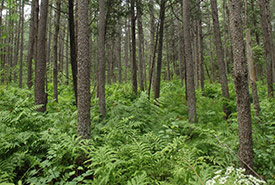
Tamarack forest (Photo by NCC)
What one habitat type runs through every province and territory, surrounds communities where most Canadians live and covers about 40 per cent of the country? If you guessed forests, you'd be right! We’re lucky to live in a country dominated...
Nature in the...parking lot?
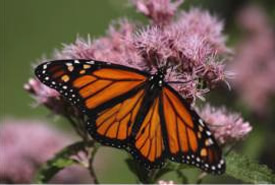
Monarch butterfly on Joe-pyeweed (Photo by NCC)
I work as a development officer at the Nature Conservancy of Canada and have lots of friends who are outdoorsy and also work in this field. This means that I am often swapping stories of cool wildlife sightings. The rare bird my co-worker spotted,...
Adventures in the night, continued!
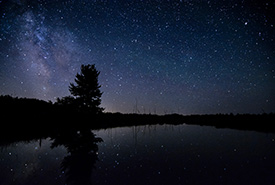
The night sky over Rankin River in Saugeen Bruce Peninsula. (Photo by Esme Batten/NCC staff)
I get it. It can be hard to look outside in the winter and think, “Wow, I want to go and explore!” When it is -20 C and the wind is blowing, it’s hard enough to get outside during the day, never mind at night. However, I...
Adventures in the night: My foray into astrophotography
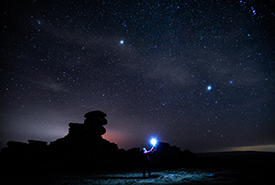
Located on Plymouth's doorstep, Dartmoor National Park is a vast moorland known for its forests, rivers, wetlands and tors (rock formations). This photo is of Great Staple Tor with me in the foreground. (Photo by Esme Batten/NCC staff)
“Are we almost there?” I ask my new friend Matt as we wander along a sea cliff on the north coast of Cornwall, U.K., shivering, in search of our shooting location for the evening. Although by Canadian standards the evening was balmy at...
Big, bold and boreal: Once complete, this will be Canada’s largest private conservation project
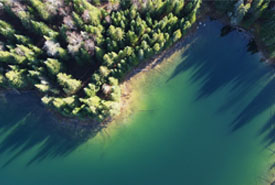
Boreal Wildlands, ON (Photo by NCC)
Spring is unfurling across the country, and those who know me know I love my birds. Birdwatching is great in any season, but I start to get a specific set of goosebumps when I hear the first sounds of migratory birds returning from the south in...
Connecting to conservation
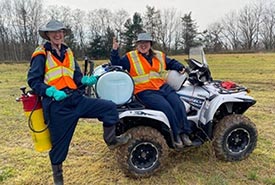
Allery Safruk and Mena Wallace, volunteer conservation interns and CCC participants, conducting invasive species control. (Photo by NCC)
Collaboration for conservation The Nature Conservancy of Canada (NCC) is one of many partnership organizations holding 12-week placements for a number of lucky Canadian Conservation Corps (CCC) participants — me included! The placement...
Between two ears: How horse riding makes me a better conservation biologist
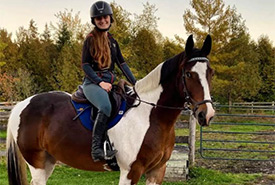
Spending time with Vegas is the best part of Megan's day (Photo by Megan Quinn/NCC staff)
There is no one single way to enjoy time in nature. Some people like to go on multi-day wilderness camping trips and fully immerse themselves in the forest, while others enjoy sitting under a tree and reading a book. A person’s connection to...
Getting bogged down
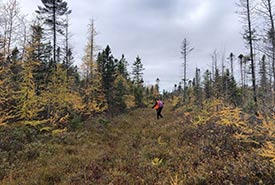
Megan Quinn leading the field team through the Alfred Bog (Photo by NCC)
It’s easy for me to get to most of the Nature Conservancy of Canada’s (NCC) properties in eastern Ontario. I load up the driving directions on my phone, and the GPS takes me right to the trailhead. I might have a strenuous hike when I...
Getting my feet wet as a conservation intern
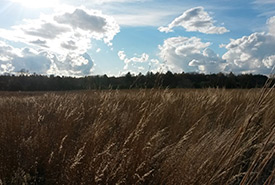
A field of tall grasses in Backus Woods. This area was where controlled burns were conducted in the previous year. (Photo by NCC)
Although I have only been working with Nature Conservancy of Canada (NCC) for a few months, my relationship with the organization goes back many years. My family have been NCC supporters for as long as I can remember. We attended Conservation...
Yay! The ducks are back!
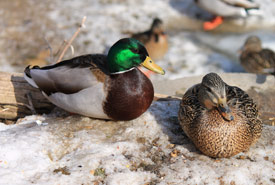
Mallards — male on the left, female on the right. (Photo by Pia Vahabi/NCC staff)
Here in Toronto, winter and waterfowl don’t necessarily sound like two things that should go together. But the truth is, while some birds (and people) escape Ontario’s cold winter to warmer climes, others migrate from the Arctic to...

